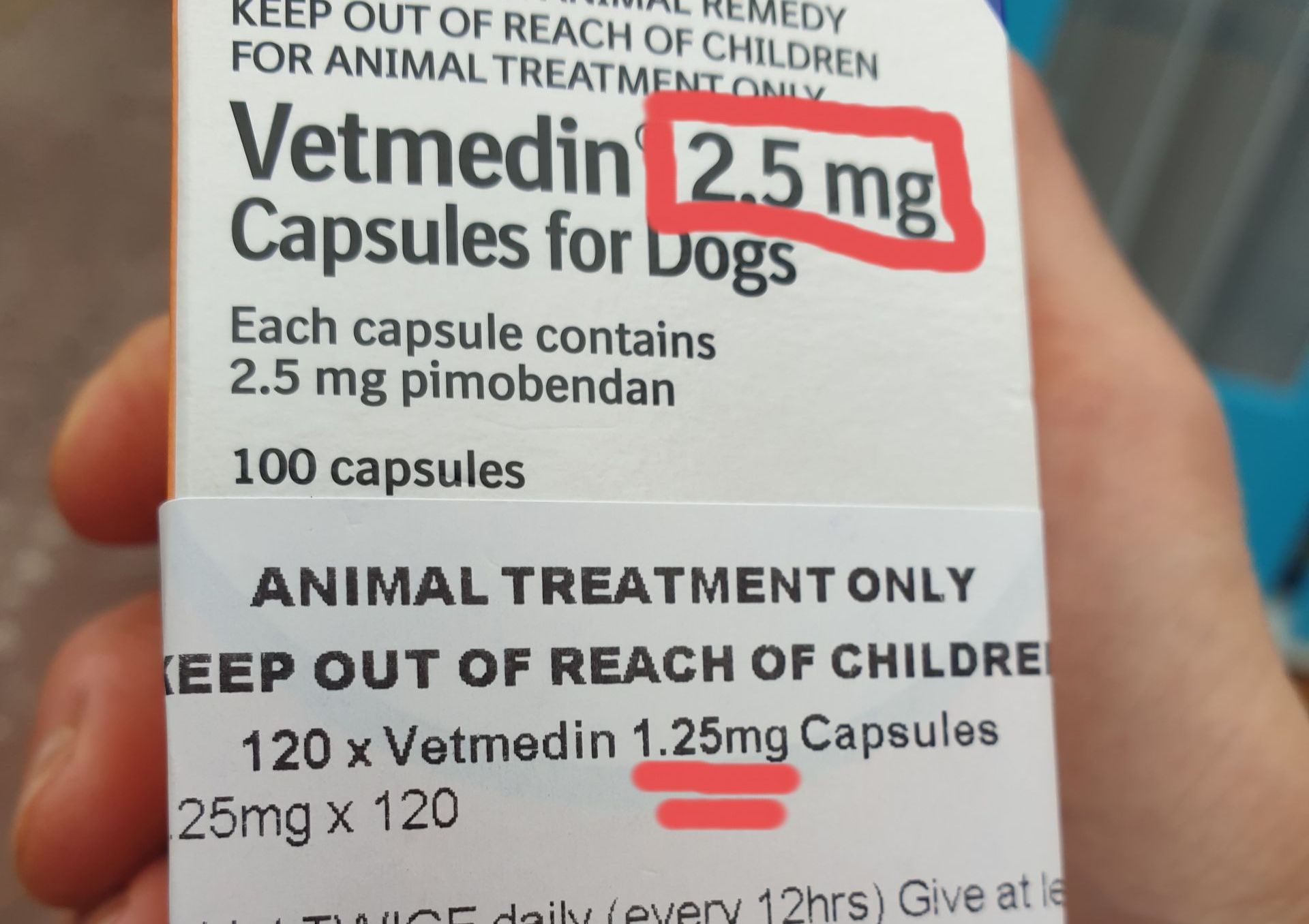Vet Practice Dispenses Potentially Fatal Double-Dose Heart Medication
Here’s how it went down.
I had just moved to Masterton (in the weeks leading up to Christmas). My regular vet practice is actually Totally Vets in Feilding – and I’m a huge fan of my dog’s actual veterinarian there, one Julia Giles. Unlike other experiences leading up to bringing my precious pooch into her care, she is diligent, thorough, caring – and while she’s a fully conventionally trained vet, she is not mentally closed off to holistic / natural treatment possibilities and efficacies. So, in short, regardless of the distance I must travel for consultations, my dog is staying in her care.
Notwithstanding, I sought to establish a secondary relationship with a local vet practice in Masterton for the purpose of (a) having a local point of dispense for my dog’s heart medication, and (b) having immediate access to a vet for emergencies.
While I experienced certain instances of incompetence in my attempts to do so with the local practice I chose to contact, these pale into insignificance in light of the most egregious of them all: the errant dispense of a double dose of my small, 6kg dog’s all-important heart medication.
Having gone through some rigamarole revolving largely around my insistence that I would NOT be changing my primary vet, I finally got this local practice to agree to the simple request of fulfilling a repeat prescription for my dog’s heart medication – a prescription duly forwarded to the practice by my primary vets i.e. TVG in Feilding.
I then visited the practice to collect my dog’s heart medication prescription.
Although I normally would not have done so, “something within” (and maybe the other lesser displays of incompetence) prompted me to open the bag and check the label on the box.
What Part of '2.5mg is NOT 1.25mg' Don’t They Understand?
To my concern, I could clearly see that the box itself read “Vetmedin 2.5mg”, despite this Masterton vet's print-out label showing the prescribed Vetmedin 1.25mg. In other words, despite the box containing double the strength of the heart medication that my own vet had prescribed (and which he has been on for several years), it had been labelled errantly as though the box contained the correct/prescribed strength of the medication. Which it did not. It contained TWICE the prescribed strength of capsule.
To be additionally noted, in an earlier phone call prior to my own vet emailing this repeat prescription to this local vet practice, I had actually been asked by the local vet practice’s receptionist which strength my dog was on, and I’d told her to wait for the prescription to arrive and to read it carefully and please ensure that I was being dispensed the correct dosage of capsule.
Standing at the counter now, I drew this double dosage being dispensed (as clearly showing on the box for anyone caring to actually read it) to the receptionists’ attention and asked for an explanation, stressing the potential implications of this act of gross incompetence i.e. dispensing a double-dose of a small and fragile dog’s prescribed strength of heart medication.
The response was that “it wasn’t me who dispensed it”. I responded that it didn’t matter to me what staff member dispensed it, the mistake was made by the same practice and stood to have the same ramifications for my dog, had I not noticed this error.
The explanation finally offered, without due concern, was that they “only had chewables in the prescribed strength”. Thus, some incompetent had taken it upon themselves to decide – since capsules had been prescribed – to simply dispense the strength of capsules that they had in stock (and label them incorrectly, as though they were as prescribed, despite the fact that they were double the prescription strength).
I pressed the issue of the (potentially fatal) consequences of this uneducated and unwarranted “judgement call”.
‘Just’ Human Error (like, No Biggie)
The response was a defensive and dismissive, “It was human error.” The inference was “just” i.e. “just” human error. No biggie.
There was a refusal to give me the box (reason: it had to be “returned to the supplier”; why?), but I reached over and took the now-empty box (as evidence) off the counter anyway and promptly left.
You’ll see from the photograph illustrating this article, that the printing on the box shows abundantly clearly that its contents are “2.5mg” capsules. That’s right there in large, bold type on the box. However, immediately below it, is the vet practice’s applied print-out label, showing 1.25mg. You will also see that the frequency of dosage is as per the prescription i.e. twice daily. Thus, had I not noticed this dispensing error, I would have been giving my dog a double-dose of the medication twice daily.
It was a dangerous act of incompetence that – if not detected by a diligent owner – could have cost my beloved dog his life.
Several Prompts to the Vet Clinic Later . . .
Returning home, I thought about not only the potentially fatal dispensing error (and the several pre-prompts to this vet clinic regarding the importance of accuracy), but also the casual, seemingly unconcerned nature of the way in which this, again,
potentially-fatal act of incompetence had been treated.
In the interests of other unsuspecting pet owners and their treasured and defenceless pets, I therefore decided to make a formal complaint to the Veterinary Council of New Zealand.
I wrote a full account of the matter, attached to my email a photograph of the plainly mis-labeled heart medication (i.e. showing the printing on the box as 2.5mg, and immediately below it, the vet's own labeling of "1.25mg" i.e. in accordance with my own vet's prescribed strength but NOT in accordance with what was actually IN THE BOX, as per the box's own clear print. See the photo accompanying this article).
I emailed this to the Registrar of the Veterinary Council and his deputy, along with my own vet, my dog's cardiologist, and (of course), the local vet clinic itself.
Several days later, no response from the local vet clinic. Nada. Not a skerrick of even an acknowledgement of my email. I did, however, receive a reply from the Veterinary Council, asking me to request of the local clinic the name of the vet involved with the dispensing of the errant prescription.
So I rang several phone numbers for the Group without result, and finally - upon trying one final branch/clinic's phone number - I found myself speaking to someone who actually understood the gravity of the matter. She provided me with several (assumedly, senior management) email addresses, asked me to send a further email, and advised me that she'd be calling those recipients immediately to tell them to read my forthcoming email - and with the appropriate urgency.
So I wrote again, as per the above instruction:
"It is concerning that no communication has been received following my sending the below email on Tuesday of this week (nor even any acknowledgement thereof).
"This matter is not a small one. You have staff who are either sloppily dispensing the wrong medication OR who are taking it upon themselves to change the prescription of a prescribing vet, and doing this without any communication to the owner of the pet in question.
"The Veterinary Council has responded with the following instruction to me:
“We’ll need you to name the specific veterinarian that you’re concerned about from (this practice).”
"I look forward to some communication that demonstrates that your practice’s ownership and managerial team are actually giving serious attention to a matter of this gravity.
"In the meantime, as evidence, please see the attached photograph of the box, its actual contents, and the labeling applied by you. NB: This is the box that your reception staff did not want me to take away with me, as you will read below."
Sincerely
Jordan Kelly
A Response . . . But Some Serious Concerns, Notwithstanding
Finally. the next day, I received a response from management - acknowledging "this incident" and assuring me that "we are currently putting in place a double-checking system on all our medications dispensed by our practice.
"This will involve every prescription to be checked by two veterinary staff members (one of whom is a veterinarian or senior staff member). The medication will be checked for the type, the strength and the dose of the medication and that the medication is for the correct patient.
"We are also sorry that the communication of the staff regarding the prescription error was not satisfactory. We have spoken to all the staff including those involved and outlined the importance of our customer care."
Well, I'm still not all that impressed, and here's why:
1) If there was indeed an appropriate level of concern, this would have - or should have - resulted in some immediate (even if interim) acknowledgement of my correspondence, without prompting that involved copying the practice in on emails to the Veterinary Council, my own vet, my dog's cardiologist, and even Consumer New Zealand.
2) How was such a serious and potentially fatal set of circumstances allowed to eventuate in the first place? Certainly, both the fact that it did, and the clinic's management advising me that they had now put appropriate and supposedly fail-safe dispensing practices in place, would indicate that they have long been operating without any such safety measures. To say nothing of the casual responses of the clinic's frontline staff.
3) I note that the eventual reply from management avoided mentioning the name of any vet - the specific item of information requested by the Veterinary Council.
CUSTOMERS OF VETERINARY CLINICS SHOULD NOTE:
Don't assume that there is any point or path of recourse against a veterinary clinic per se. Unless you can get the name of a specific vet, you - the client, and your pet - are on your own.
From a communication by the Veterinary Council of New Zealand:
"Under the Veterinarians Act 2005, VCNZ is responsible for regulating individual, practicing veterinarians. We don’t regulate veterinary clinics or veterinary support staff; therefore, we are unable to consider a complaint about a veterinarian clinic generally."
So, my advice, is to not be reticent in asking questions, or in questioning the advice or practices or conduct, of any veterinarian or veterinary clinic . . . Don't be lulled into some false sense of security that you'll have any overseeing industry or professional body to look into anything on your behalf (or that they will); no matter how serious. Even if your pet dies. It'll be too bad for you, basically. To put it baldly, you have no guarantee that anybody will give a flying F-K, much less execute any disciplinary action. (It's the same 'ol, same 'ol. In both my opinion and in my experience, the "industry watchdogs" are more concerned to protect their own, wherever they can. It's the same in almost every industry across the board. The only difference is that in the veterinary and medical industries, the result could be fatal.)
4) So much for management's claim that: "We have spoken to all the staff including those involved and outlined the importance of our customer care."
Their accounts department certainly didn't get the memo. On the morning of the 25th of January, I received a very terse phone call telling me that I had an outstanding invoice for my dog's heart medication.
In no uncertain terms, I advised the staffer (I have her name, if management gives a stuff and wants it) that not only had the practice acted in a manner that could have had fatal consequences for my dog, but they had not exactly been "best practice" in their communications, and now - to add insult to injury - she was ringing me in a most unfriendly manner to demand payment for a product that (mercifully) I never took possession of (aside from the empty box, as evidence of the mis-labeling incompetence).
Said staffer responded that "I haven't heard anything about it". I suggested her employing organisation "get your shit together" and that "I'll leave it with you", and hung up. A very short while later, I found an "Overdue Invoice" in my email inbox.
Highlighting their continuing incompetence, check out the fact that the invoice claims to have dispensed the correct dosage i.e. 1.25mg of the heart meds - when, in fact, as this article and the photographic evidence illustrating it, demonstrates, they actually dispensed the outlined potentially fatal double dosage (2.5mg) you see on the box, and that my copious correspondence to them has detailed.


I mean . . . could it get any worse? I'd call it a prime clown show, but this degree of incompetence and the potentially fatal consequences such could have, is FAR FROM FUNNY.
Other News, Reviews & Commentary

Want to suggest a topic?
Send us your topic ideas, feedback, or any commentary on your own experience as a doggie parent.
Want to Contribute?
We will get back to you as soon as possible.
Please try again later.
YOUR PRIVACY
Our use of your submitted information is limited to the sole purpose of responding to you and/or to contacting you to follow up on any suggestion you have submitted to us. Under no circumstances do we share your email address with any other party for any reason.





